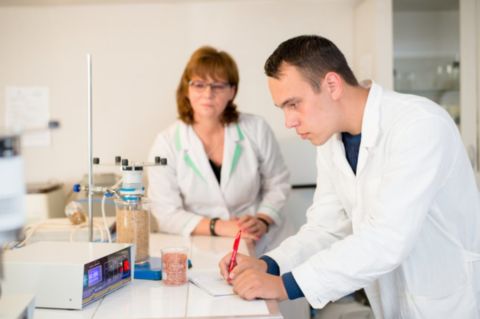Scientists and graduate students of South Ural State University, together with colleagues from India, have developed and patented a biodegradable material based on starch for food packaging. It will reduce environmental pollution from polyethylene and plastic. This unique material will be produced from plant biopolymers (by-products of grain processing) using ultrasound and existing technological equipment, significantly reducing the production cost.
New environmentally friendly packaging
The issues of recycling polymer waste do not lose their relevance due to the steady growth of polymer product use and their negative impact on the environment. For several years, a team of scientists from the SUSU School of Medical Biology has been developing fundamentally new biomaterials. The first samples of molded products and film materials were obtained, in particular, eco-dishes and edible bioplastics were made.
Young scientists Aram Tsaturov, Artem Malinin, Natalya Naumenko, Uday Bagale (a young scientist from India working at the University under the Postdoc program) together with D. Sc., Professor Irina Potoroko are working on obtaining a new biodegradable composite material based on plant biopolymers.
“Today, there is a steady positive dynamics of growth in the volume of municipal solid waste due to an increase in the number of used packaging materials in the municipal sector. The share of plastic products accounts for about 40% of household waste. As estimated, the average use time of the package is about 20 minutes, and the duration of its decomposition is more than 100 years. The solution to this problem requires creating a biodegradable material based on a composition of plant polysaccharides of various types, which could decompose in the environment in a short time into substances that are safe for nature,” D. Sc., Professor Irina Potoroko says.
Scientists have selected the optimal component composition of plant biopolymers and their ratio to obtain a film material. For the processing of the composite solution, they proposed to modify the traditional technology with additional sonication. The resulting materials have a homogeneous structure, have increased elasticity, and guaranteed biodegradability.
New technology application
The new composite biodegradable materials can be used in medicine, pharmaceuticals, the food industry, to obtain packaging materials, films, and capsules with desired characteristics.
The peculiarity of these materials is that they can completely decompose in compost and do not create an additional burden on the environment after disposal.
To date, the scientific team has developed a technology for producing biodegradable materials based on plant raw materials using an ultrasonic effect, patent for invention 2731695. Prototypes of biodegradable material (films) and molded materials (plates) in laboratory conditions have been produced.
In the future, scientists plan to use different ingredients to form film products and plates using various technological approaches. If the technology is tested successfully in industrial conditions, scientists hope to introduce it into production.
SUSU is a participant of Project 5-100, which aims to enhance the competitiveness of Russian universities among the leading research and educational centers.
Research in the field of new materials and ecology is one of the priorities of the Ural interregional scientific and educational center "Advanced production technologies and materials". It was created due to the joint efforts of UrFU, SUSU, KSU, other regional higher educational institutions, the Ural branch of the Russian Academy of Sciences, industrial enterprises, and governments of the Chelyabinsk, Sverdlovsk, and Kurgan regions.




